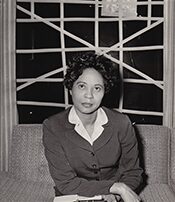Sharon La Cruise remembers forgotten female civil rights hero in ‘Daisy Bates: First Lady of Little Rock’
Share
Explore Our Galleries
Breaking News!
Today's news and culture by Black and other reporters in the Black and mainstream media.
Ways to Support ABHM?
by Olu Gittens, TheGrio
Black journalist and filmmaker Sharon La Cruise has taken a seven-year journey to tell the story of Daisy Bates, the activist and former Arkansas NAACP head who helped organize the desegregation of Little Rock Central High School in 1957. The advocate for a group of students historically called the Little Rock Nine, Daisy Bates was glamorous, outspoken, divisive and at times mysterious.
[…]

Bates was an central part of organizing one of the most memorable events of the Civil Rights Movement, yet as a woman her name is largely forgotten in black history. The tale of Daisy Bates is an important one for all those interested in advancing the social perspectives of black women, while filling in the gaps left in our political memory.
Read an interview with the filmmaker here.
Learn about the Little Rock Nine. Read one woman’s journey to discovering her family’s racist history.









Comments Are Welcome
Note: We moderate submissions in order to create a space for meaningful dialogue, a space where museum visitors – adults and youth –– can exchange informed, thoughtful, and relevant comments that add value to our exhibits.
Racial slurs, personal attacks, obscenity, profanity, and SHOUTING do not meet the above standard. Such comments are posted in the exhibit Hateful Speech. Commercial promotions, impersonations, and incoherent comments likewise fail to meet our goals, so will not be posted. Submissions longer than 120 words will be shortened.
See our full Comments Policy here.